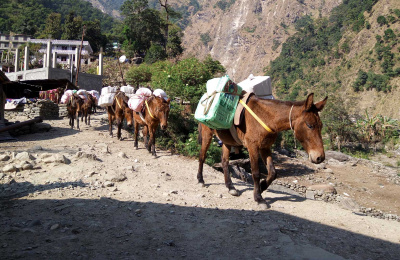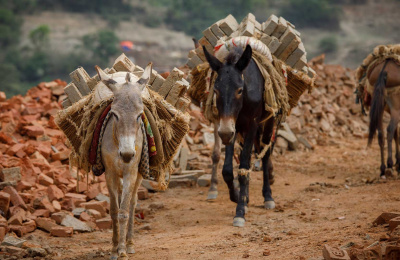To mark the UN's International Day of Rural Women, we look to a pioneering donkey welfare project funded by The Donkey Sanctuary in western Zimbabwe.
First observed on 15 October 2008, the UN's International Day of Rural Women is a day to reflect on and recognise the critical role of women in agricultural and rural development.
In the rural Matebeleland North and South Provinces of Zimbabwe, donkeys are crucial partners in the daily lives of local women.
Climate change has been having a noticeable impact in the region, causing local water bodies to dry up, meaning that women need to travel long distances in search of water.
Donkeys play a pivotal role in the community by reducing the time women spend transporting water, allowing them to spend more time generating an income. The donkeys also help the women and their children journey to health centres and clinics.
For Women and Land in Zimbabwe (WLZ), a local Non-Governmental Organisation, improving the welfare of local donkey populations is part of an innovative approach for enhancing the resilience of local women.
With funding accessed through The Donkey Sanctuary's Covid-19 Emergency Response Fund (CERF), WLZ has run a comprehensive donkey welfare project that has reached 1,175 donkey owners and 3,683 donkeys.
The project used group study sessions to help promote key concepts of donkey welfare. The concepts taught will help ensure that donkeys work rotationally and have access to appropriate housing, thereby reducing strain or injury.
WLZ has also engaged in training on the preparation of donkey feed made from locally available drought-tolerant crops. This training will help to ensure that donkeys have access to feed during the dry seasons when foraging options are scarce. The donkey owners have also been provided with starter seed packs to produce drought-tolerant crops suitable for donkey fodder.
Lindiwe Ndlovu, one of the donkey owners who accessed the training, said: "In this area, the dry season is always harsh on our donkeys. The training on donkey fodder preparation using locally available resources and drought-resistant crops has enabled us to have a steady supply of feed for our donkeys through this season."
In the longer term, the lessons learned through these study circles and training sessions will help keep the donkeys fit, healthy and able to continue helping, even in times of drought. By building the resilience of their donkey companions, the donkey owners have helped develop their own resilience.
In conjunction with the study circles and training programme, the funds accessed through our CERF programme have enabled WLZ to offer infrastructural support to the local communities and their donkeys.
WLZ has built three robust donkey feed storage units near irrigation schemes that help to supply local farms with water. The crops surrounding the irrigation schemes will be used to create donkey fodder, helping to ensure a sustainable food source.
Nine donkey water points have also been built adjacent to the irrigation schemes. Each water point holds up to 200 litres, and they have been providing 405 donkeys with direct access to clean drinking water per day. With their proximity to the irrigation schemes, the water points are readily available through the dry season.
Nine mineral licking blocks complement the water points and have proved very popular with the local donkey population. Project beneficiaries have noted that their donkeys have increased appetites and feed on forage they used to ignore since they started licking the blocks. This has significantly contributed to improved body condition within the donkey population.
The strong emphasis on the connections between women and their donkeys has resonated particularly strongly with the donkey owners.
WLZ staff have noted a new saying that has emerged in two of the districts in Matebeleland North: "I am a woman donkey owner. Judge me by the condition of my donkey, my pride."
With the funds accessed through our CERF programme, WLZ have delivered a project that champions the quality of life for donkeys and the community that lives alongside them. By taking this innovative approach to the problems faced by rural women in Zimbabwe, WLZ has been able to develop the resilience of a local community and the animals that play such an essential role in their day-to-day lives.
Reflecting on the project and its potential to reach more communities in rural Zimbabwe, Cynthia Nkomo, Agricultural Extension Officer at WLZ, says: "The project has been an eye-opener for donkey owners, and its spillover effects will improve overall herd health of donkeys in the neighbouring wards."





